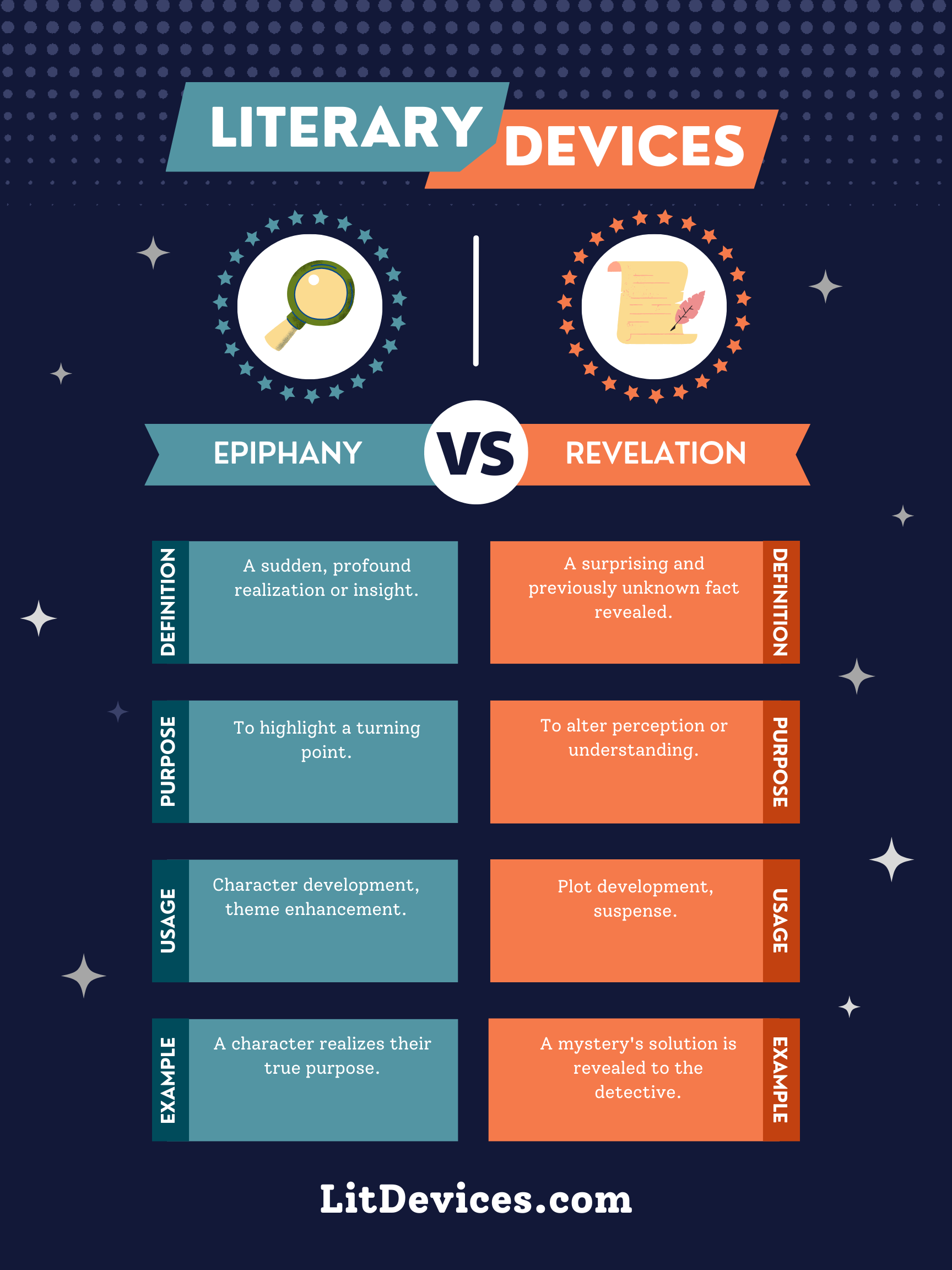Epiphany is a sudden, insightful moment of understanding; Revelation involves a significant fact being revealed, often changing perception.
Epiphany 💡
An Epiphany in literature refers to a moment when a character experiences a sudden insight or realization that changes their understanding of themselves or their situation. It’s like a light bulb turning on above their head. James Joyce, in his collection of short stories “Dubliners,” frequently uses epiphanies to reveal his characters’ sudden insights into life, often highlighting moments of personal clarity and disillusionment.
Revelation 🔍
Revelation, on the other hand, involves the unveiling of previously hidden information or truths to a character or the reader, significantly altering the narrative or perception of the characters involved. This can be seen in mystery novels or suspenseful stories, where key facts are disclosed at crucial moments, like the identity of a secret antagonist in Agatha Christie’s detective stories.
Summary
| Literary Device | Definition | Purpose | Usage | Relevant Examples |
|---|---|---|---|---|
| Epiphany | A sudden moment of insight or understanding. | To highlight a character’s internal growth or realization. | Used in novels, short stories, and personal narratives. | James Joyce’s “Dubliners”. |
| Revelation | The unveiling of significant information or truth. | To alter the narrative’s direction or characters’ perceptions. | Common in mystery, thriller, and suspense genres. | Agatha Christie’s detective stories. |
Writing Tips
To effectively incorporate epiphanies or revelations into your writing, consider these strategies:
- For Epiphany: Build your character’s journey towards this moment of insight. Let their experiences, reflections, and interactions gradually lead them to this pivotal realization. This doesn’t have to be dramatic; even quiet moments of understanding can be powerful.
- For Revelation: Plan your story’s revelations carefully to ensure they have maximum impact. Foreshadowing and subtle clues can make the eventual unveiling more satisfying for your readers. Be mindful of pacing—reveal too much too soon, and you risk deflating suspense.
FAQs
Q: Can a story have both epiphany and revelation?
A: Yes, many stories effectively combine both devices, using revelations to drive the plot forward and epiphanies to deepen character development.
Q: Are epiphanies only experienced by characters?
A: While typically focused on characters, readers can also experience epiphanies, gaining new insights into the story or themes through the characters’ realizations.
Q: How do I decide when to use an epiphany or a revelation?
A: Consider your narrative goals. Use an epiphany for personal growth or character realization and a revelation for altering the story’s direction or revealing key plot points.
Exercise
Read the paragraph below and decide if it describes an epiphany or a revelation:
“After years of rivalry, Emma suddenly understood her sister’s actions were not of malice but of misunderstood love. This realization made her see their entire relationship in a new light.”
Answers:
- This paragraph describes an Epiphany because it focuses on a character’s sudden personal insight into her relationship with her sister, leading to a change in her understanding and feelings.
Other Device Comparisons You May Find Interesting
- Foreshadowing vs Foretelling: Understanding the art of hinting versus directly predicting future events.
- Irony vs Sarcasm: Delving into the differences between situational irony and the sharp bite of sarcasm.
- Simile vs Metaphor: Comparing two key figures of speech that draw comparisons to add depth to descriptions.
- Flashback vs Foreshadowing: Examining the contrast between looking back into the past and hinting at future events.
Exploring the distinctions between Epiphany and Revelation opens up new avenues for enriching narratives, allowing writers to weave complex, engaging stories that captivate and resonate with readers.

